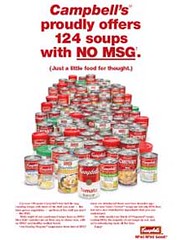
"A brand isn't what you say about it, it's what other people say about it." — Linda Eatherton, partner and director of Ketchum's Global Food & Nutrition Practice.
At least that is what Eatherton told Marketing Daily on the heels of a study that reveals: branding lags well behind taste, quality, and price when consumers choose food. While there is no doubt that Eatherton's statement might be music to some people's ears — as it is what many social media experts have been saying for some time — it's also misleading.
Brands are not only built by what others say about them.
Brands are built by many factors, including what the company says about itself and others, what the competition says about themselves and others, and what other stakeholders, including consumers, say about all of them.
In the food industry, branding tends to play last for several reasons. First, many companies invest in product branding over company branding. Second, food branding tends to include the qualities and properties of the product, such as taste, quality, and price. Third, grocery store branding, locality, and stock also plays a fundamental role, at least in the United States.
In other words, people tend to think they need "bread crumbs," drive to their preferred grocer, and choose from the available selection based on those qualities mentioned. There are some exceptions. Rather than think "cereal," someone might think "Cheerios" because they already associate some qualities with that brand (enough to pass on any imitations, anyway). But "General Mills," the company that makes Cheerios, may never even enter their mind.
Highlights from the Ketchum's Global Food & Nutrition Practice survey.
• 74 percent cited taste as a key consideration, except China, where 78 said health benefits were more important.
• 66 percent said that where the food comes from is important, but 60 percent said taste still always trumps food sourcing.
• 63 percent said they want to recognize all of the ingredients on a food label, with Argentina being the most concerned.
• Only 33 percent said that “brand name” is among the most important factors when buying food, with brand slightly more important in China and Argentina at 45 percent.
The survey polled 1,000 consumers in the U.S., the U.K., Germany, Argentina and China. It included 200 respondents from each country. For additional details, you can find the release here.
The Global Food & Nutrition Practice survey reminds companies to think.
In my opinion, the survey is interesting and useful in that it reminds companies to think in terms of the obvious. If the food does not taste good, people won't buy it. If too many foods from the same manufacturer do not taste good, or if a crisis occurs, then consumers might avoid it. In extreme cases, the entire product line, regardless of manufacturer, might also be avoided (think bagged spinach last year).
So the bottom line is that if manufacturers hope to build a brand that people remember, then the branding is best built from those qualities that consumers are looking for. And once a brand is established, then the brand needs to vigilantly demonstrate that the qualities associated with it are true.
Hmmm ... isn't this the very lesson we recently learned in the soup war between Campbell and General Mills? They both concluded that the back of the can has become more important than the front of the can. And, in a classic case of how brands are shaped by what companies say about their competition, Campbell learned it's never a good idea to throw stones at MSG-laced soups if consumers might discover that the pot was calling the kettle black.













